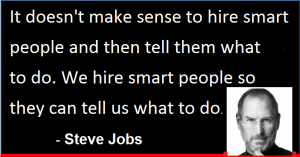It’s a big ‘No-No’ to get associated with people who are micromanaging things in their personal and professional lives. It is certainly not a productive measure. I have only seen it as a disaster. While it is obvious that managers and decision makers need to know what’s going on; who is doing what; why something is taking longer time; details of expenses; important projects and timeline etc. But, when managers start micromanaging, it poses more problems than it solves. It creates a vicious circle of blame game, anxiety and half truths. Even the most sincere and well wishing micromanagers unintentionally induce wrong ideas and nervousness among their peers and subordinates.
Micromanagement is a common style of direction whereby a manager closely observes and controls the work of employees. If you are always micromanaging, it means you hired the wrong person or you are not clear of what you want. Even in our personal relationships with siblings, spouse, children and friends when someone is keeping a close watch on us, it is damn irritating. Indeed, if you have ever worked for a boss who’s always hovering over you, monitoring your progress, obsessing over minor details, providing you with detailed instructions, and having a talk with you about every mistake you make, you will start finding ways and means to evade such a moron. He/she can really get on your nerves.
Usually people micro-manage when they feel disconnected. When someone rises through the ranks, the person often feels concerned that he/she has lost touch with the actual work of the organization. Such a person tries to connect through various means to connect with the employees with whom he/she has dealt with. It is true that people at top feel isolated. One way of reducing this anxiety is to seek information in as many ways as possible. But, it appears like micromanagement because the actions are unplanned and driven by eccentric anxiety, the result is that managers at different levels and functions end up looking at the same basic data in many different ways.
Many managers are unable to let go of their old job or their old ways of doing their work. Many managers get promotions based on their ability to achieve operational goals, manage budgets, control their numbers, and solve problems. However, at higher levels, managers usually need to dial down their operational focus and learn how to be more strategic. To do so, managers have to trust their people to manage day-to-day operations and coach them as needed, rather than trying to do it for them. For many managers this is a difficult changeover and they unconsciously continue to spend time in the more comfortable operational realm of their subordinates.
Some people in their personal life habitually micro manage. They probably don’t even know that they are doing it. They are never quite satisfied with anything. They often feel frustrated because they want a task to be performed in a different way. They have an eye for details. A friend of mine after getting her clothes ironed from the laundry irons her clothes once again. After the gardener water the plants, she still likes to sprinkle some water, I see her painstakingly doing each job again and again, she is hardly satisfied with anything. Her grownup children avoid talking about their any problems with her. Her spouse does not leave a single chance of travelling; in fact he prefers going outstation under some or other pretext.
It’s a plain truth; paying attention to details and making sure the work is getting done is important. It’s always better to chalk all of the plan and steps of doing a job in advance. Once you discuss it with your team, there is no need to hover around and keep a watch on them. The problem with micromanagers is that they apply a lot of passion, scrutiny and in-your-face approach to every task, even if it’s not warranted. The bottom line is: if you are a micromanager, you need to stop because it is harming you, your team and everyone around you.
The best movies on micromanaging in office culture are ‘Office Space’, ‘Up in the Air’ and ‘All the President’s Men’. Office Space (1999) is an offbeat comedy from Mike Judge, which provides pinching funny commentary on the most ridiculous parts of corporate life, from mandatory birthday cake to TPS reports. It follows Peter Gibbons (Ron Livingston), an underwhelmed IT programmer who barely tolerates his commute, his bosses, and their endless memos and TPS reports. That is, until he’s hypnotized into not caring at all. What follows is pure comedy. Office Space works on multiple levels. It’s highly effective as a satirical look at corporate culture, because it so closely mirrors so much of what those who work there experience. It showcases how those obsessed bosses micro manage their subordinate’s work life making them anxious and ruining their personal lives.
If you are a micromanager, it might initially be difficult to stop your micromanaging impulses; but pull back slowly. Start building trust in your people. You will live peacefully and longer.














































